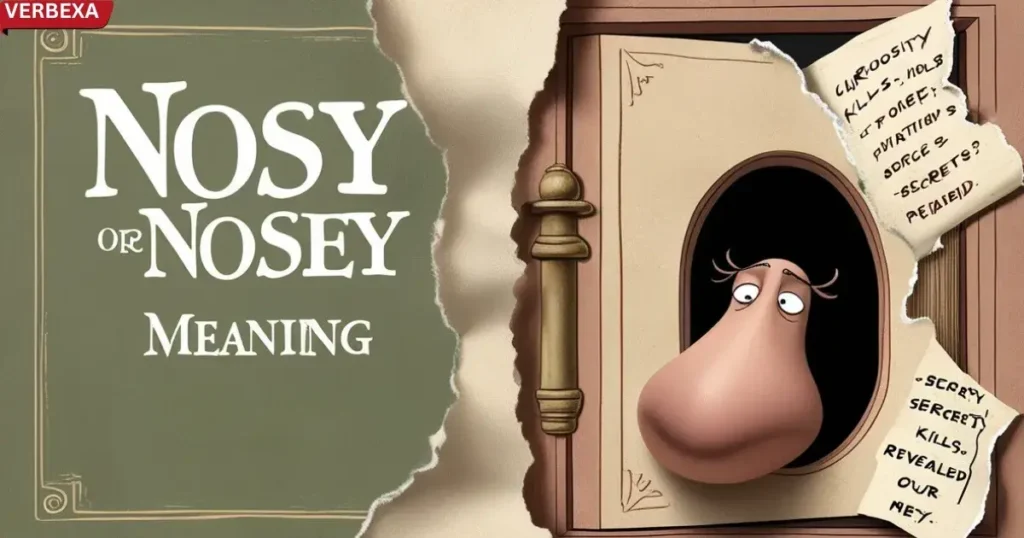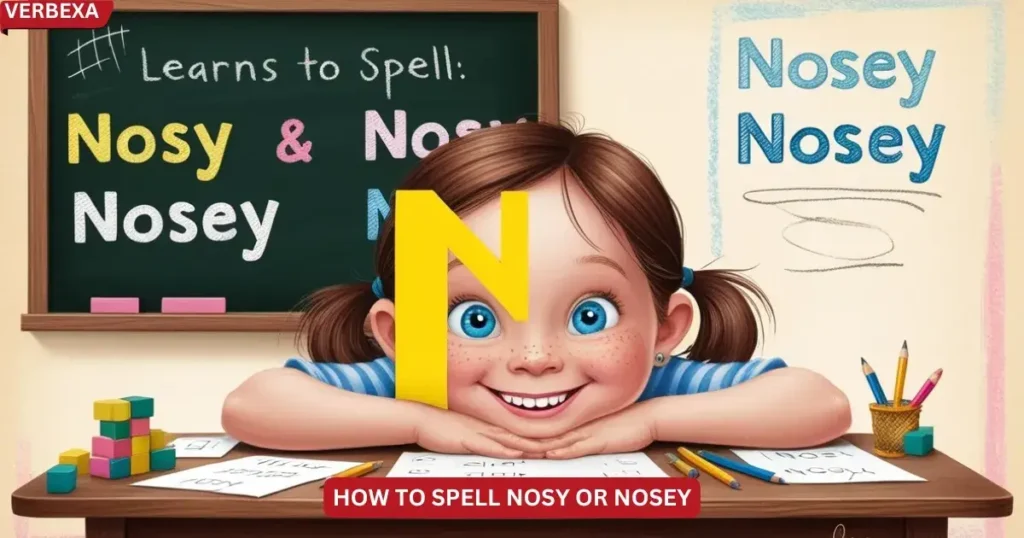Have you ever caught yourself hesitating between writing nosy or nosey when describing that overly curious neighbor? You’re not alone. The question of how to spell nosy has puzzled writers and English language enthusiasts for years. This comprehensive guide will unravel the difference between nosy and nosey, exploring their meanings, usage, and the subtle nuances that set them apart.
Definitions and Core Usage: Nosy or Nosey
Nosy and nosey both refer to the same concept: an individual who is overly curious about things that don’t concern them, often invading others’ privacy. But here’s where it gets tricky: while both spellings are acceptable, there are some subtle differences in usage and regional preference.
Let’s start with a simple definition.
- Nosy: This is the most common spelling of the word and refers to a person who is excessively curious or intrusive.
- Nosey: This is a variant of nosy, though it’s less frequently used and generally considered a less formal spelling.
The main difference between the two forms is spelling, not meaning. The rest of the discussion revolves around usage, context, and formality.
Nosy or Nosey Meaning

To understand the difference between nosy and nosey, let’s break down their meanings:
- Nosy: This adjective describes a person who shows an excessive interest in other people’s business or private matters. For instance, a nosy neighbor might constantly peek through their windows or ask probing questions about your personal life.
- Nosey: As mentioned, this is just an alternative spelling of nosy. The meaning remains the same: someone who is unduly curious or prying into matters that do not concern them.
It’s easy to see why these terms are often used interchangeably. However, “nosy” is the more commonly accepted form, especially in American English.
When to Use Nosy or Nosey
So, now that we know both words mean the same thing, when should you choose one over the other?
- Nosy: This is the preferred spelling in both American and British English. It’s used most frequently in everyday language and is considered the standard spelling by most dictionaries, including the Oxford English Dictionary.
- Nosey: While it’s not wrong to use nosey, it’s less formal and less common. It tends to be more popular in British English, but even then, it’s still regarded as an alternative form. If you’re looking for a more casual or informal tone, you might find nosey creeping into conversations, though it’s still rare in formal writing.
Synonyms for Nosy or Nosey
Both nosy and nosey share the same meaning, so it follows that their synonyms are also interchangeable. Here are 10 synonyms for both words:
Synonyms for Nosy / Nosey:
- Curious
- Inquisitive
- Prying
- Snooping
- Meddlesome
- Intrusive
- Eavesdropping
- Interfering
- Probing
- Busybody
These words all share the common theme of undue curiosity or intrusiveness into someone’s affairs. The difference is mainly in tone—words like “prying” or “snooping” tend to have a more negative connotation, suggesting an invasion of privacy.
Comparison Table: Nosy vs Nosey
| Aspect | Nosy | Nosey |
|---|---|---|
| Definition | Overly curious or intrusive | Overly curious or intrusive |
| Preferred Spelling | Standard spelling (American/British) | Alternative, less formal spelling |
| Usage | Most commonly used | Less commonly used |
| Connotation | Neutral to slightly negative | Slightly informal or negative |
| Context | Widely accepted in formal/informal settings | More casual; less used in formal writing |
| Geographical Preference | Common in both British and American English | More common in British English, but still rare |
When to Use Each Term
- If you want to use the most common and standard form, choose nosy. It is the preferred term in both American and British English. Whether you’re writing a formal letter, an academic essay, or just chatting with friends, nosy is the safe bet.
- If you’re looking for a more informal or relaxed tone, nosey could be the choice, though it is less standard and may sound less polished in more formal settings. It’s best reserved for casual conversation.
Everyday Usage Examples
To help you solidify your understanding, here are some relatable examples of nosy or nosey in sentences:
- Nosy:
“That nosy neighbor keeps peeking through the blinds every time I walk out of the house.”
“She’s always asking nosy questions about my personal life.” - Nosey:
“Stop being so nosey! It’s none of your business where I’m going.”
“I can’t stand my nosey coworker who always tries to overhear my calls.”
As you can see, both terms work the same way in a sentence, with only the spelling changing.
How to Spell Nosy or Nosey

It’s easy to get tripped up on spelling when it comes to words like nosy or nosey. The key thing to remember is that nosy is the standard spelling used most frequently. However, if you prefer to use nosey or encounter it in someone else’s writing, that’s okay too. But, for accuracy and clarity in professional or formal writing, it’s best to stick with nosy.
When Context Matters
The choice between nosy or nosey spelling often depends on your audience and region. While the Oxford dictionary recognizes both forms, American publications strongly favor “nosy,” while British writers occasionally use both forms, though “nosy” is still more common.
FAQs
Is it spelled nosy or nosey?
The correct spelling is “nosy,” though “nosey” is an alternative, less commonly used version, especially in informal contexts.
What does very nosey mean?
Being “very nosey” refers to someone who is excessively curious about others’ private matters, often in an intrusive way.
What is another word for being nosey?
Synonyms for “nosey” include words like curious, inquisitive, prying, and snooping, all suggesting undue interest in others’ affairs.
Am I nosey or curious?
If you’re overly interested in things that don’t concern you, you might be considered “nosey,” while “curious” generally refers to a more neutral interest in learning.
Conclusion
When you find yourself in the nosy or nosey debate, remember these key points:
- Both nosy and nosey mean the same thing: overly curious or intrusive behavior.
- Nosy is the preferred, standard spelling in both American and British English.
- Nosey is an alternative, less formal spelling, more common in casual contexts.
- Always choose nosy for formal writing and when in doubt.
By now, you should feel confident in your understanding of nosy or nosey, spell nosy correctly. Whether you’re eavesdropping, snooping, or just trying to learn the right way to spell nosy, knowing these distinctions will help you sound more polished and precise in your language.
Next time someone asks you, “How do you spell nosey?” or “Nosy or nosey meaning?”, you’ll have all the answers!

This author is a passionate linguist and grammar enthusiast, dedicated to helping individuals master the art of language. With years of experience in teaching and editing, she brings clarity and precision to every sentence. Tina’s mission is to empower writers of all levels to express themselves with confidence and excellence.

